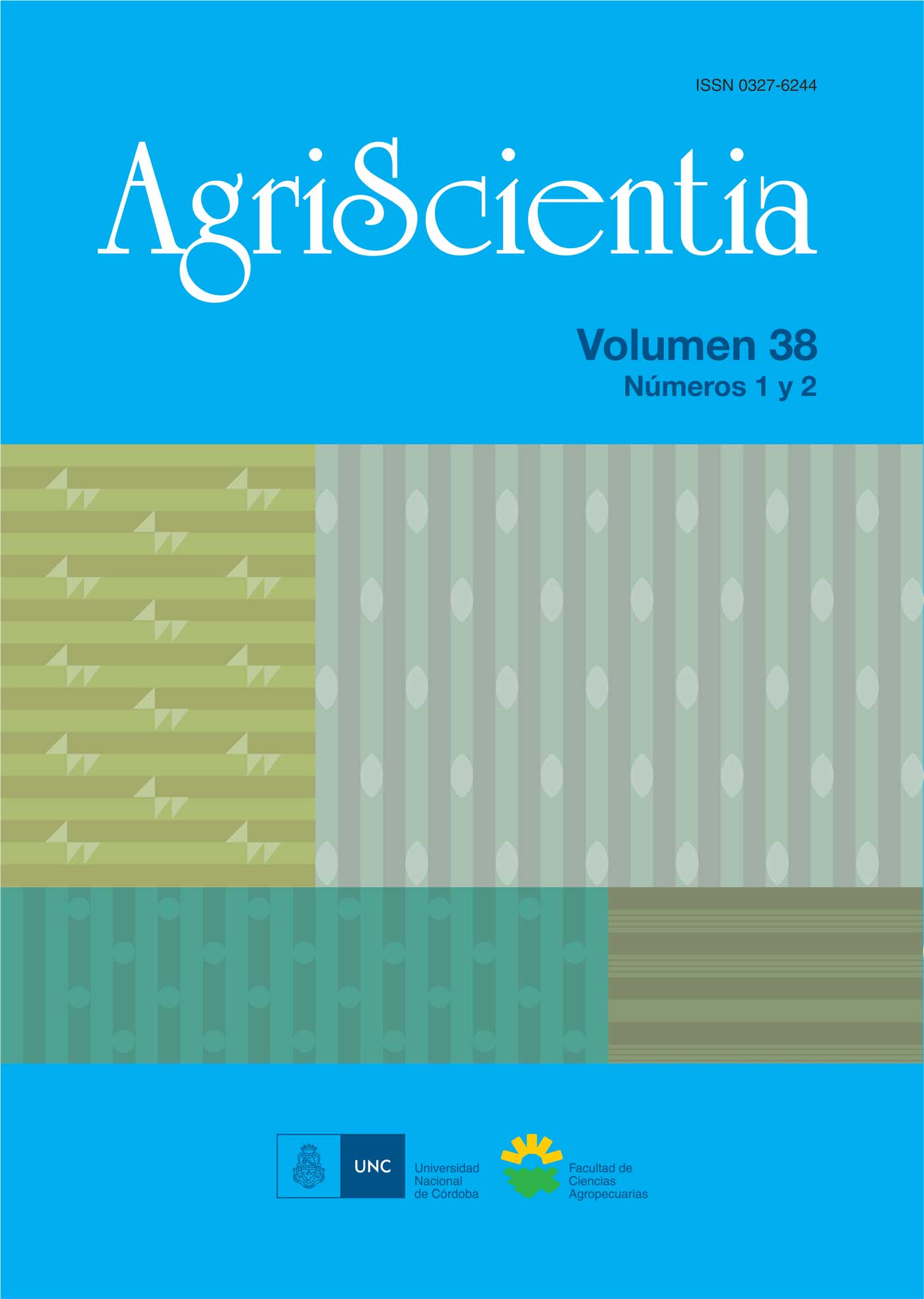Banana somaclonal variation assessed by Amplified Fragment Length Polymorphism profiles at early cycles of in vitro culture
Main Article Content
Abstract
Banana micropropagation for obtaining free-virus plants frequently provokes somaclonal variation that could increase useful genetic variability in this asexually propagated crop. Both exploring the cycle of in vitro culture in which somaclonal variation occurs and the amount of generated polymorphism, are necessary. In this work, preliminary results of somaclonal variation during early cycles of banana in vitro culture are reported. Four randomly selected regenerated plants from the fifth cycle and two samples from the mother plant were analyzed. A total of 36 AFLP primer combinations were assayed, and 24 of them produced amplicons varying among 50- 500 bp. The mother plant presented a total of 125 different amplicons while the regenerated plants jointly showed 131 different amplicons with a mean of 119.75 ± 3.97 per individual. High level of DNA polymorphism (24.43 %) was found among micropropagated plants and, additionally, the occurrence of somaclonal variation at earlier cycles was suggested by multivariate analysis of Principal Coordinates. In this study, somaclonal variation at early cycles of banana micropropagation was validated and the adequacy of AFLP technique to assess it at the molecular level was verified. The phenotypic effects of the detected somaclonal variations remain to be evaluated.
Article Details
Issue
Section

This work is licensed under a Creative Commons Attribution-ShareAlike 4.0 International License.
How to Cite
References
Bairu, M. W., Fennell, C. W. and van Staden, J. (2006). The effect of plant growth regulators on somaclonal variation in Cavendish banana (Musa AAA cv. ‘Zelig’). Scientia Horticulturae, 108(4), 347-351. https://doi.org/10.1016/j.scienta.2006.01.039
Carrera, F. P., Noceda, C., Maridueña-Zavala, M. G., García, J. A., Ruiz-Barzola, O. and Cevallos-Cevallos, J. M. (2021). Changes in the metabolite profile during micropropagation of normal and somaclonal variants of banana Musa AAA cv. Williams. Horticulturae, 7(3), 39. https://doi.org/10.3390/horticulturae7030039
Deepthi, V. P., Simon, L. and Narayanaswamy, P. (2007). Identification of elite somaclonal variants from tissue cultured Grand Naine banana (Musa spp. AAA) types using RAPDs. Fruit, Vegetable and Cereal Science and Biotechnology Journal, 1(2), 116-120.
Balzarini, M. and Di Rienzo, J. (2003) Info-Gen: Software estadístico para análisis de datos genéticos. Facultad de Ciencias Agropecuarias. Universidad Nacional de Córdoba. Argentina. https://www.info-gen.com.ar/
Ermini J. L., Tenaglia, G. and Pratta, G. R. (2018). Molecular diversity in selected banana clones (Musa AAA “Cavendish”) adapted to the subtropical environment of Formosa Province (Argentina). American Journal of Plant Sciences, 9(12), 2504-2513. https://doi.org/10.4236/ajps.2018.912181
Kodym, A. and Zapata-Arias, F. J. (1998) Natural light as an alternative light source for the in vitro culture of banana (Musa acuminata cv ‘Grande Naine’). Plant Cell Tissue and Organ Culture 55, 141-145. https://doi.org/10.1023/A:1006119114107
Menon, R. (2016). Banana breeding. In S. Mohandas and K. Ravishankar (Eds.), Banana: genomics and transgenic approaches for genetic improvement (13-44). Springer.
Opara, U. L., Jacobson, D. and Al-Saady, N. A. (2010). Analysis of genetic diversity in banana cultivars (Musa cvs.) from the South of Oman using AFLP markers and classification by phylogenetic, hierarchical clustering and principal component analyses. Journal of Zhejiang University- Science B, 11(5), 332–341. https://doi.org/10.1631/jzus.B0900310
Razani, M., Kayat, F., Redwan, R. M. and Susanto, D. (2019). Effect of somaclonal variation in Musa acuminata cv. Berangan through micropropagation using RAPD. Biotechnology, 18, 9-14. https://doi.org/10.3923/biotech.2019.9.14
Rebouças, T. A., de Jesus Rocha, A., Sousa Cerqueira, T., Ramalho Adorno, P., Queiroz Barreto, R., dos Santos Ferreira, M., Souza Morais Lino, L., Batista de Oliveira Amorim, V., Almeida dos Santos-Serejo, J., Haddad, F., Fortes Ferreira, C. and Perito Amorim, E. (2021). Pre-selection of banana somaclones resistant to Fusarium oxysporum f. sp. cubense, subtropical race 4. Crop Protection, 147, 105692. https://doi.org/10.1016/j.cropro.2021.105692
Resmi, L. and Ashalatha, N. S. (2007). Plantlet production from the male inflorescence tips of Musa acuminata cultivars from South India. Plant Cell, Tissue and Organ Culture, 88, 333-338. https://doi.org/10.1007/s11240-007-9206-7
Senerchia, N., Felber, F. and Parisod, C. (2015). Genome reorganization in F1 hybrids uncovers the role of retrotransposons in reproductive isolation. Proceedings of the Royal Society, 282(1804). http://doi.org/10.1098/rspb.2014.2874
Suman, S. (2017). Plant tissue culture: A promising tool of quality material production with special reference to micropropagation of banana. Biochemical Cell Architecture, 17 (1), 1-26.
Youssef, M., Ku-Cauich, R., James, A., Escobedo Gracia Medrano, R. M. (2011) Genetic analysis of somatic embryogenesis derived plants in banana. Assiut Journal of Agricultural Sciences, 42(Special Issue), 287-300.





